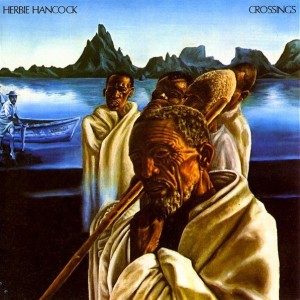Herbie Hancock – Crossings Warner Bros. BS 2617 (1972)
Herbie Hancock’s brief tenure on Warner Bros. Records was somewhat akin to Thelonious Monk‘s tenure on Prestige Records. Both tend to be relatively overlooked periods tucked in between more widely known recording periods. For Monk, his early recordings for Blue Note Records have become as highly regarded as any recordings of the 20th Century, and later albums for Riverside are fan favorites. Yet that middle Prestige period was a fertile one that debuted many classics of the Monk songbook. For Hancock, his early recordings for Blue Note Records have long been the subject of the mainstream jazz hype machine, with a couple of those early albums — like Maiden Voyage — frequently mentioned alongside works as well-known as Kind of Blue, and then his decades-long association with Columbia Records producing some of the best-selling jazz of all time with Head Hunters and the like. But the middle period on Warner Bros. Records was when he radically changed his musical vision. He reached out into fusion territory. While Hancock’s vision wasn’t unprecedented, drawing heavily from pioneering work by Miles Davis, it was distinct. And his early fusion recordings displayed more genuine experimentation and creativity than the near-pandering qualities of some of his later fusion efforts.
Crossings was recorded with Hancock’s Mwandishi sextet, which also recorded Mwandishi and Sextant. Compared to its predecessor, Mwandishi, the musical approach of Crossings is quite similar. Though if anything the band goes out a little further here. The word most often applied to this music is “atmospheric”, and there is probably no question about that description. Rock-oriented showiness is nowhere to be found. What distinguishes this music from most other fusion of the day are its long-form conception and its slow, smoldering tempos. The balance of collective and individual improvisation was key to the success of the album’s mellow yet searching tone. An enjoyable listen, and surely among Hancock’s very best recordings, even if Sextant proves to be still better.

